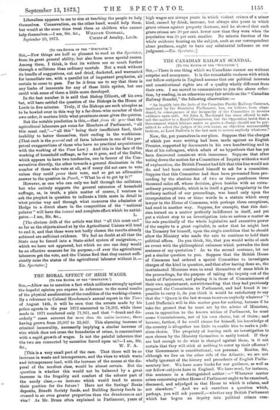[TO TRH ED/TOR OF THE "SPECTATOR;']
Sin,—Few things are half so pleasant to read as the Spectator, from its great general ability, but also from some special causes.
Among them, I think, is that its writers see so much further through a millstone than ordinary mortals. Not a week without its bundle of suggestions, cut and dried, docketed, and warranted for immediate use, with a parallel lot of important prophecies, all certain to come to pass. Far be it from we to say that there is any limbo of innocents for any of these little sprites, but one could wish some of them a little more developed.
In the last number it is said that Bishop Ellicott, off his own hat, will have settled the question of the Bishops in the House of Lords in five minutes. Truly, if the Bishops are such ninepins as to be bowled over in this way by a far-from-wise member of their own order, it matters little what proximate cause gives the quietus.
But the notable prediction is this,—that from the year that the agricultural labourers get votes for Members of Parliament, " all this must end,"—" all this" being their insufficient food, their inability to better themselves, their ending in the workhouse. (That such is the general end of farm labourers in one of the per- petual exaggerations of those who have no practical acquaintance with the working of the Poor Law.) And this in the face of the working of household suffrage, as far as it goes, and of the Ballot, which appears to have two tendencies, one in favour of the Con- servatives directly, the other towards a general diminution in the number of those who vote at all, as if many did not care to vote unless they could prove their vote, and so get an affirmative answer to the question in Punch, "What be of to get by it?"
However, as one who can only see half through the millstone, but who entirely supports the general extension of household suffrage, as, in truth, a plain matter of course, I venture to ask the prophet in question to indicate a little more in detail in what precise way and through what measures the admission of Hodge to a direct share in the composition of the " national palaver " will have the instant and complete effect which he antici- pates.—I am, Sir, &c., L. [The obvious drift of the article was that "all this must end" so far as the objects aimed at by the Agricultural Unions will tend to end it, and that these were not badly chosen the results already achieved are sufficient evidence. We feel no doubt at all that the State may be forced into a State-aided system of emigration,— which we have not approved, but which no one can deny would be an effective measure for its purpose,—if ever the agricultural labourers get the vote, and the Unions find that they cannot suffi- ciently raise the status of the agricultural labourer without it.— ED. Spectator.]






























 Previous page
Previous page